Warren Hastings Impeachment (1788-1795) part II
Warren Hastings’ Impeachment
Part II-The Road of Politics has a lot of Potholes and certainly no true friends
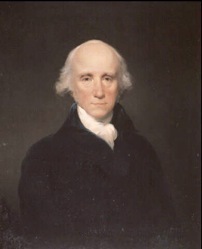
Hastings trial began on February 13th 1788. It took place in Westminster Hall Members of the House of Commons were seated to Hastings right, the Lords to his left and a large audience of spectators, including royals in boxes and public galleries.
Edmund Burke began the proceedings with a long public address. He took four days and treated it all seriously. However most thought the trial resembled a social event.
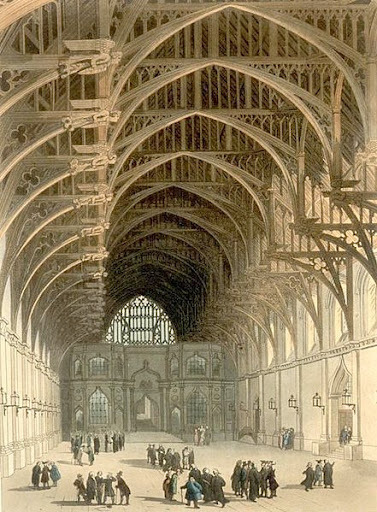
Westminster Hall in the Palace of Westminster, London, November 1808
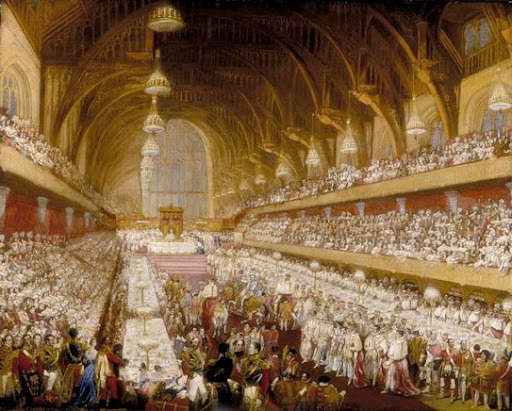
The Coronation Banquet of King George IV in Westminster Hall, 1821 (A very Regency Era representation of the site that was used to try Warren Hastings)
Hastings was granted bail, despite Burke arguing that he would flee the country with the wealth he had allegedly stolen from India. Other leading Whigs made speeches over the coming weeks against Hastings. Proving that the trial was not about wrongdoing so much as political maneuvering. Charles James Fox spoke against the man as well as Richard Brinsley Sheridan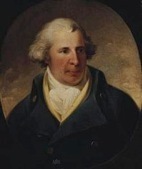 was a playwright and a poet. Sheridan served as Treasurer of the Navy 1806-1807 and also was the owner of the Theatre Royal, Drury Lane. He is known for his plays such as The Rivals, The School for Scandal and A Trip to Scarborough.
was a playwright and a poet. Sheridan served as Treasurer of the Navy 1806-1807 and also was the owner of the Theatre Royal, Drury Lane. He is known for his plays such as The Rivals, The School for Scandal and A Trip to Scarborough.
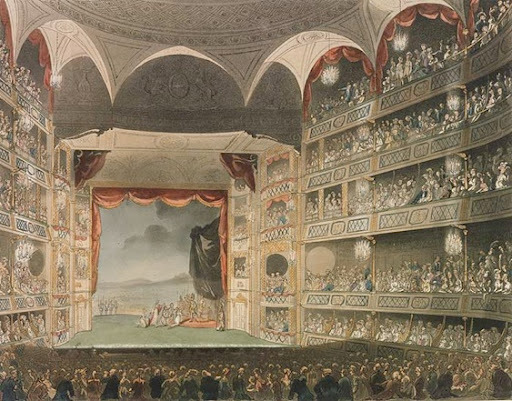
Interior of Theatre Royal, Drury Lane. Circa 1808. Plate 32 of Microcosm of London (1808) The play is Coriolanuis.
In total nineteen spoke against Hastings as part of the Impeachment Committee. With Sheridan and so many gathered to witness, it does sound like a theatrical production. While at first, the Whigs had gotten public sympathy on their side over the issue, Sir Phillip Francis having worked so hard to vilify Hastings. But the trial dragged on for months, then years.
When the French Revolution began in 1789, Sheridan, obviously attuned to his audience as a member of the theater community said that he was “heartily tired of the Hastings trial” despite being one of its instigators. Doubt now had permeated into society about Hasting’s guilt. James Gilray the cartoonist depicted Hastings as the “Saviour of India” and he was being assaulted by Burke and Fox.
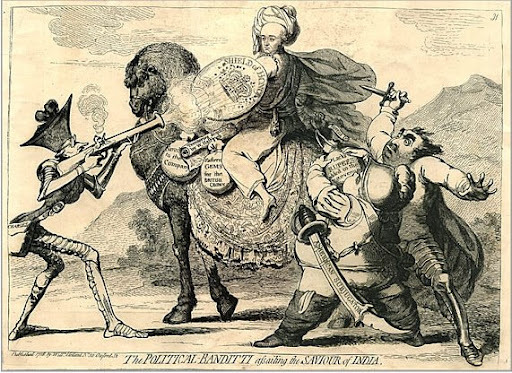
Then on April 9th, 1794 Lord Cornwallis 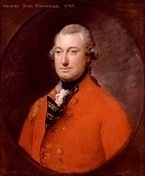 who was the second Governor General of India gave testimony in defense of Hastings. He reported that the natives of India respected Hastings. When asked if he had “found any just cause to impeach the character of Mr Hastings?” he replied “never”.
who was the second Governor General of India gave testimony in defense of Hastings. He reported that the natives of India respected Hastings. When asked if he had “found any just cause to impeach the character of Mr Hastings?” he replied “never”.
William Larkins the former Accountant General of Bengal then testified that there were no irregularities with Hasting’s administration. The Whigs had hoped that they would have had a lot of testimony showing corruption but many came forward as character witnesses for Hastings.
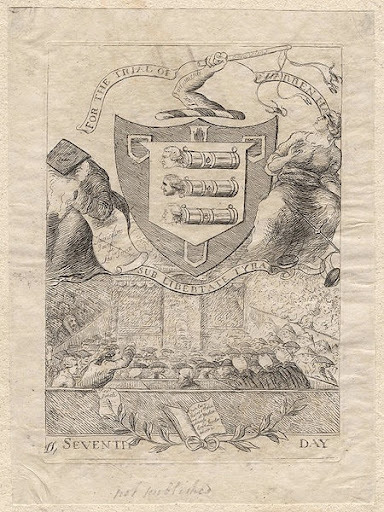
For the trial of Warren Ha(stings)’ (includes Edmund Burke; Charles James Fox; Sir Philip Francis; Warren Hastings), by James Sayers (died 1823)
23 April 1795 the Lord Chancellor Lord Loughborough 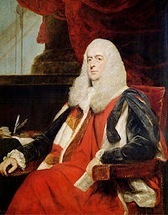 presided over the delivery of the verdict. A third of the lords who had attended the opening of the trial seven years before were now dead. Only 29 had sat through enough evidence to pronounce judgement. Most of the charges, there were 16, Hastings was found not guilty unanimously. On three questions only did five or six peers say he was guilty, but 6 of 29 meant that 23 at least found him not guilty of those charges. It was an overwhelming verdict and had been expected for some time.
presided over the delivery of the verdict. A third of the lords who had attended the opening of the trial seven years before were now dead. Only 29 had sat through enough evidence to pronounce judgement. Most of the charges, there were 16, Hastings was found not guilty unanimously. On three questions only did five or six peers say he was guilty, but 6 of 29 meant that 23 at least found him not guilty of those charges. It was an overwhelming verdict and had been expected for some time.
Edmund Burke died 2 years later and believed in Hasting’s guilt to his dying day. He believed that the Lords acquitting Hastings would lead “to the perpetual infamy of the House of Lords.”
If Hastings had been super wealthy, the impeachment broke him and left him with debts of £70,000. The government and the East India Company did come to his aid in the end and helped to pay for it. The Lawyer made out like a true Nabob of India, though. Richard Shaw(e) had his mansion Casino House in Herne Hill built from his fees. He had John Nash and Humphrey Repton as the architect and Landscaper.
In 1812 Hastings was asked by Parliament to speak as an expert on India. After which, all the members rose in acknowledgement. Something that they only did for members of the Royal family.
As more came out, the role of Pitt abandoning the support of Hastings, and allowing the impeachment to go forth was seen as a Political power play. Pitt feared that he was to be tarred by the same brush wielded by those trying to ruin Hastings. And in the end, the total exoneration of Hastings proves he had never been guilty but helped to begin the transition of rule in India by the East India Company, to the British Government.











